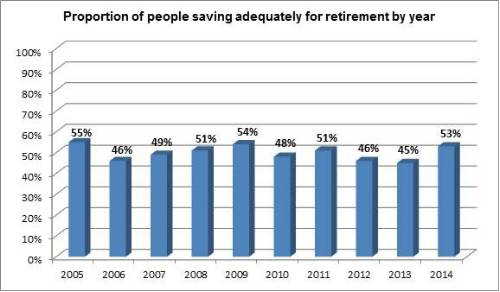The number of people saving adequately for retirement at 53% is the highest it has been since 2009 and the biggest ever year-on-year rise, up from 45% in 2013, as the impact of auto-enrolment and improvements in the wider economic environment begin to take effect.
The monthly amount people are saving towards retirement outside a pension has also increased by 141% from £54 in 2006 to £130 in 2014, and the total amount people have in savings and investments is at its highest ever level; an average of £40,000 per person, according to the tenth Scottish Widows Retirement Report. Even when discounting those who have large amounts of savings[1], this represents an increase of almost £5,000 on 2013 levels alone – from £28,964 to £33,678.

Auto-enrolment is playing an important role in increasing the number of people preparing adequately for retirement, with the average proportion of earnings put aside for employees of companies with 250 staff or more increasing from 9.7% to 11.6%. This is almost 4 percentage points more than the long-term minimum required under automatic enrolment of 8% of earnings, showing people are increasingly understanding the importance of long-term savings for retirement.
Improving attitudes towards finances and the wider economy have also played their role, with 37% of people saying they felt optimistic about their long term finances compared to 32% in 2013.
The proportion of people who cite affordability as a reason why they don’t plan to save any more over the next 12 months continued to fall from 71% in 2012, to 68% in 2013 and 59% in 2014; and the number of people free from debt reveals a positive trend, increasing from 13% in 2012, to 14% in 2013 and 16% in 2014.
There is however still some way to go. One in three people (33%) say that they have no idea of the extent to which their pensions, savings and investments will meet their retirement income needs. In addition, although optimism about long term finances is on the up, it is still lagging far behind 2005 levels; over half of Britons (51%) were optimistic about their long-term finances in 2005, compared to 37% in 2014. A third (32%) of people do not believe they will be better prepared for their retirement than their parents were.
Ian Naismith, Pensions Expert at Scottish Widows said: “A decade of tracking retirement savings trends has shown us the impact that events such as the recession, auto-enrolment and the recent Budget announcements have had on the nation’s savings behaviour. It is heartening to see that finally people are starting to sit up and take notice of the importance of planning for the future – whether this be through proactively upping their contributions due to a more favourable economic climate, or starting to make plans for their retirement for the first time thanks to auto-enrolment.
“Although we have undoubtedly made some significant strides forward since our research first began, there are still some groups who are not preparing adequately for a comfortable later life and are at risk of slipping through the net. While celebrating the success of the wider savings picture, we must not forget to identify and support these at-risk groups, such as the self-employed or part time workers, to make sure they too have a plan for securing their financial future and do not get left behind.”
|

